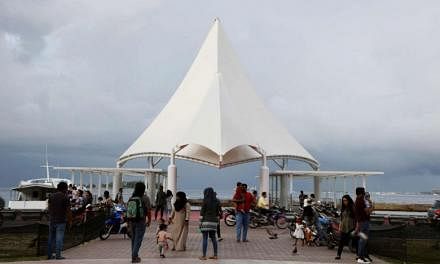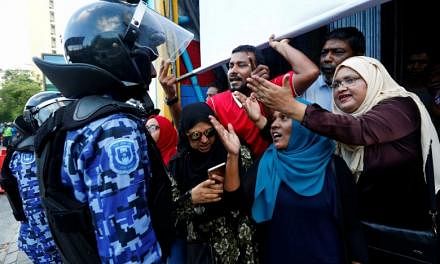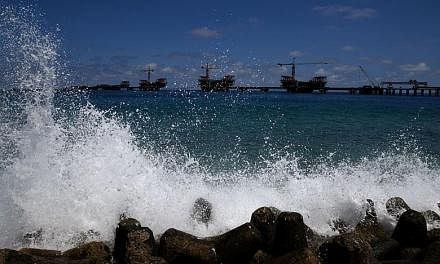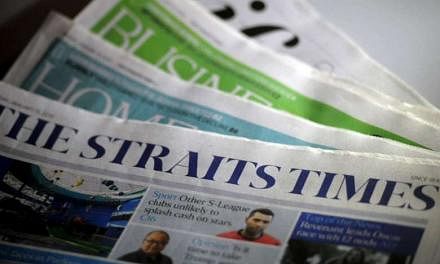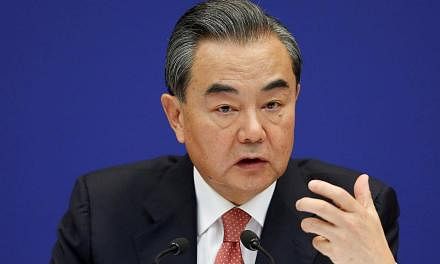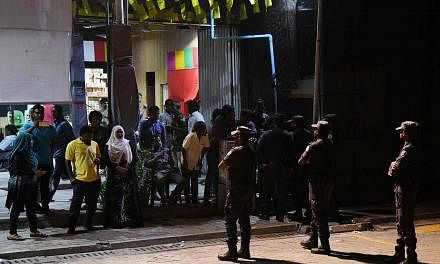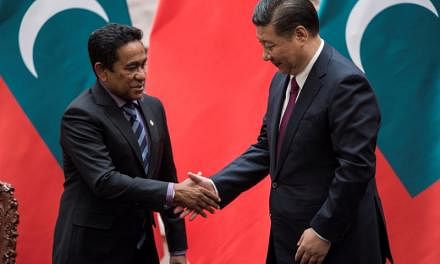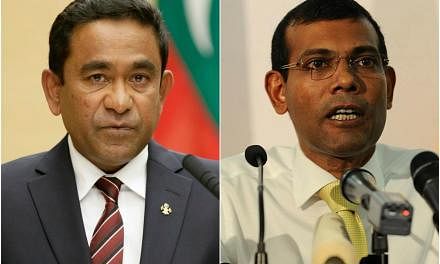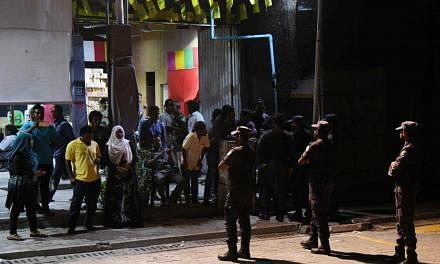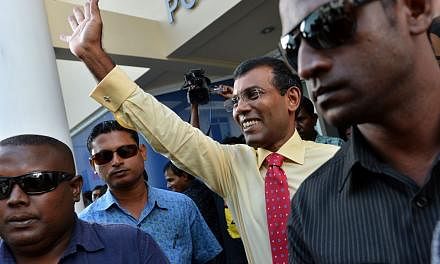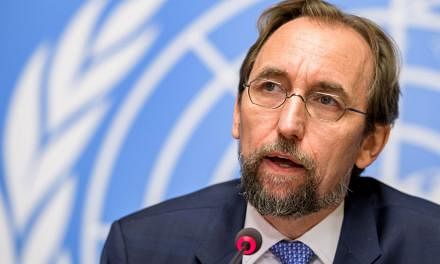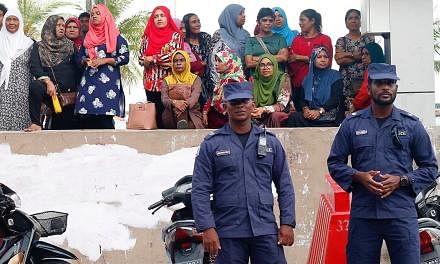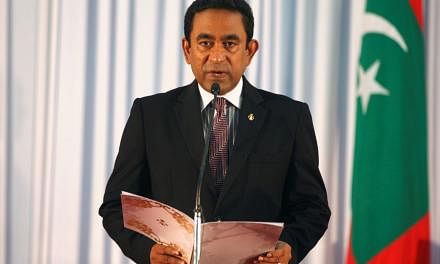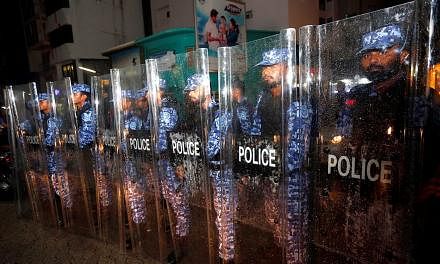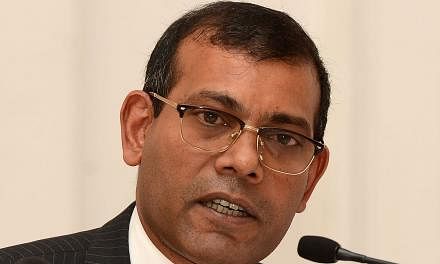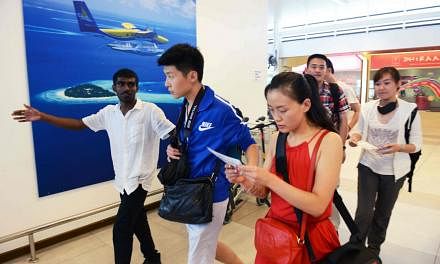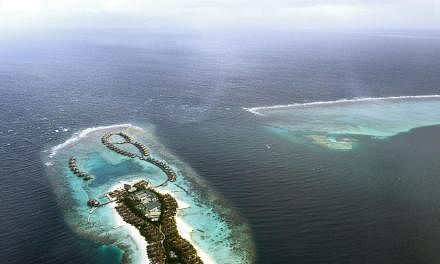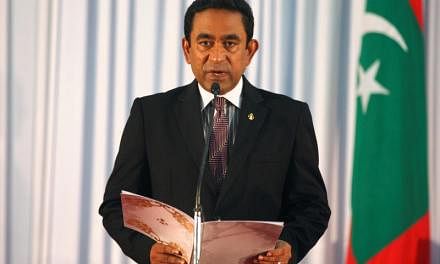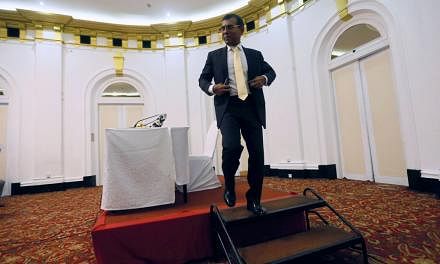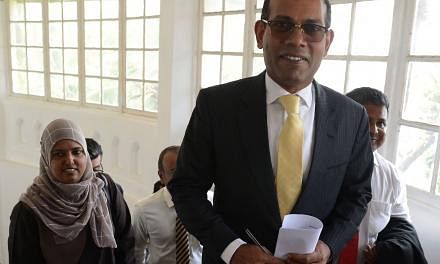MALE, MALDIVES - The Maldives, caught in a political system struggling to emerge from decades of strongman rule, has been in crisis since last week, when the Supreme Court quashed convictions ranging from corruption to terrorism of nine opposition figures, including former president Mohamed Nasheed - its first democratically elected leader.
Tension came to a head when President Abdulla Yameen's government rejected the ruling, imposed a state of emergency on Monday (Feb 5) and then, in the early hours of Tuesday, arrested the chief justice and another judge of the court.
The court's ruling would have paved the way for the return of Nasheed, two years after he left his homeland following the controversial terrorism conviction.
The latest turmoil has prompted the UN Security Council to take up the matter, with UN Secretary-General Antonio Guterres on Tuesday urging the government of the Maldives to lift the state of emergency.
Here's a look at some of the key players in the crisis that is engulfing the overwhelmingly Muslim nation of 400,000 people.
THE PRESIDENT
President Abdulla Yameen declared a state of emergency on Feb 5, after defying a shock ruling from the Supreme Court which ordered the release from jail of former president and opposition leader Nasheed, and eight other political prisoners, on grounds that the cases against them were politically tainted.
Yameen came to power in 2013 after winning an election the opposition said was rigged. Critics accuse his government of imprisoning opponents, curbing free speech and exerting pressure on the judiciary.
THE EXILED EX-PRESIDENT
The president's rival Nasheed became Maldives' first democratically elected president in 2009, but was forced to resign amid a mutiny by police in 2012.
After losing the election to Yameen the following year, Nasheed was sentenced to 13 years in prison in 2015 on charges that he said were concocted by Yameen's government.
Allowed to leave jail to seek medical treatment abroad, Nasheed was granted asylum by Britain in 2016. He has said he wants to contest a presidential election due later this year, and was in Colombo when the Supreme Court decision precipitated the crisis.
After Yameen declared a 15-day emergency on Tuesday, Nasheed called on India, the main regional power, to intervene.
Nasheed, a graduate of Britain's Liverpool University, is well connected in the West and has been able to bring pressure against Yameen's administration.
During Nasheed's imprisonment, human rights lawyer Amal Clooney, the wife of Hollywood actor George Clooney, championed his cause and helped expose alleged human rights violations by Yameen's administration.
Nasheed, during his presidency, had drawn world attention to the Maldives by conducting an underwater Cabinet meeting, with the ministers wearing scuba diving suits, to highlight the dangers posed by global warming to low-lying island nations like his own.
THE SUPREME COURT
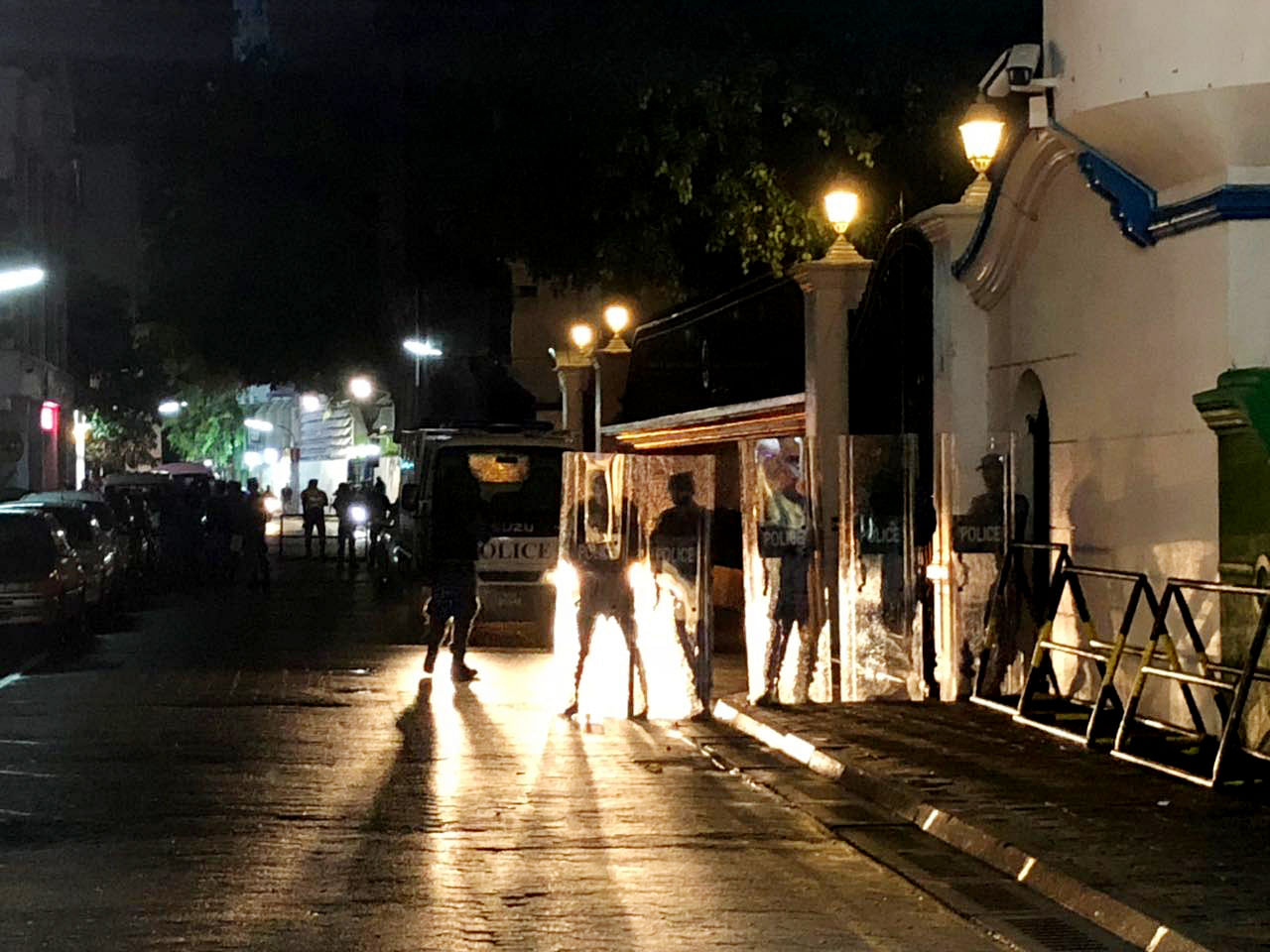
Maldives Chief Justice Abdulla Saeed and Judge Ali Hameed were arrested at dawn on Tuesday (Feb 6) after security forces stormed the court complex in the capital Male, following the court's quashing of convictions against Nasheed and eight other opposition leaders.
It had also ordered the reinstatement of 12 lawmakers who had been stripped of their parliamentary seats by Yameen's party for defecting last year, saying their removal was unconstitutional.
The reinstatement of the dozen legislators, who now belong to opposition parties, would cause Yameen's party to lose its majority in the 85-member assembly.
Should the opposition reach a majority, they would be able to unseat the speaker, who is a member of the ruling party, and pass no confidence motions against government officials.
The state of emergency imposed gave the government sweeping powers to arrest and detain individuals and curtails the powers of the judiciary and the legislature.
In a televised address to the nation, Yameen said he had acted to prevent a coup and implied the judges had sided with his enemies as they were under investigation for corruption.
Late on Tuesday, the remaining three judges reinstated Nasheed's 2015 terrorism conviction and reversed their earlier order to free eight other political prisoners. That means Nasheed risks re-arrest if he returns to run against Yameen in the upcoming election.
THE POLICE AND MILITARY

The president had earlier fired two police chiefs who said they would uphold the court order to release Yameen's opponents.
The army appears to be supporting Yameen. On Sunday, state television showed several police and soldiers saying they were ready to sacrifice their lives "in the defence of the lawful government".
Yameen's supporters have shut down an independent television station.
PRESIDENT YAMEEN'S FOES
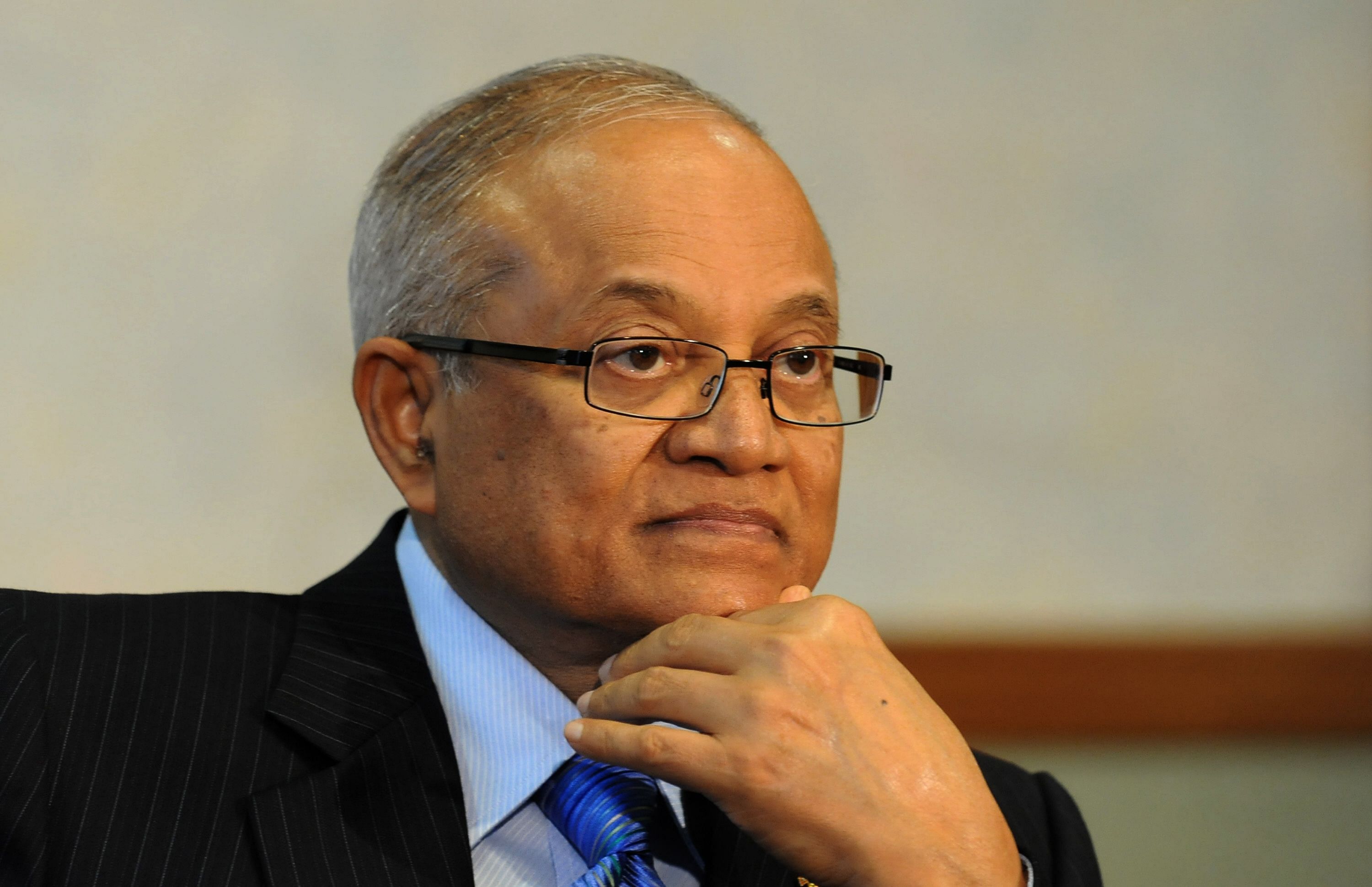
Yameen ordered the arrest of his estranged half-brother, former president Maumoon Abdul Gayoom, who last year sided with the opposition.
The 80-year-old Gayoom - who was president for 30 years until Maldives' first democratic elections in 2008 - was previously the only senior opposition figure still at liberty in the Maldives. He was taken from his home in Male around midnight on Monday, hours after the emergency was declared.
Police have also detained three relatives of Supreme Court judge Ali Hameed and the son of another exiled opposition leader Qasim Ibrahim - among the nine mentioned in the original court order.
Nasheed on Wednesday demanded Gayoom's release, saying the latter has not been eating since his arrest.
Nasheed also urged the release of Judge Hameed, who he said had been ill-treated in detention.
Hameed and Chief Justice Abdulla Saeed are accused of accepting bribes to impeach the president.
Opposition sources meanwhile linked the arrest of Qasim Ibrahim's son to allegations that Qasim was a key figure behind the latest attempt to topple the president. Qasim ran for president in 2013 and currently heads the opposition Jumhooree Party.
INDIA

In a Twitter post, Nasheed on Tuesday requested India to send an envoy, backed by its military, to release the judges and political detainees.
He also urged the United States to block financial transactions of Yameen's government.
Both the US and India have urged Yameen to heed the court decision, but he has disregarded international calls to solve the crisis through dialogue.
New Delhi sent troops to the Maldives in 1988 to foil a coup, purportedly involving foreign mercenaries.
CHINA

The Maldives, best known for its luxury beach resorts, is seen as part of a broader battle for influence in the Indian Ocean between India and China.
It has assumed greater importance since China began building political and economic ties in its so-called "String Of Pearls" strategy to create a network of ports in the Indian Ocean.
On Wednesday, China cautioned against any foreign meddling in the islands' internal affairs, after Maldives' opposition leaders called for intervention by India.
India, which historically has had greater clout in the islands, has sought to push back against China's growing influence. But it has been silent on the calls for intervention.
The Maldives withdrew from the Commonwealth, the association of former British colonies and dominions, in 2016 after being threatened with suspension for failing to show progress on democracy.
SOURCES: REUTERS, AFP

